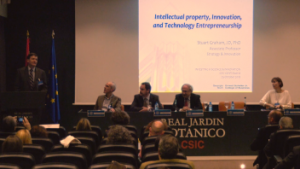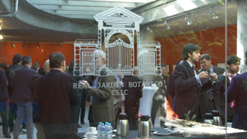The workshop “Investing in Science and Innovation” was held on 25 October 2018 at the Real Jardin Botanico in Madrid. It gathered eight well-known economists and high-level decision makers from the public and private sector as speakers to discuss different ways to promote innovation and how to transform scientific research into innovations.
More than forty participants from different universities, research centers, law firms, and companies from Madrid and other Spanish regions attended the event, which was jointly organized by CSIC and CEMFI in the framework of the PRODECON-CM project “Finance, Innovation and Strategy: Economic Analysis of Firm Productivity and its Determinants” (PRODECON-CM Project S2015/HUM-3491) funded by the Regional Government of Madrid and the European Social Fund.
The workshop started with a welcome speech by Elena Dominguez, CSIC Vicepresident of International Affairs, followed by opening words by the organisers of the workshop: Gerard Llobet, Associate Professor at CEMFI, and Catalina Martínez, Tenured Researcher at CSIC Institute of Public Goods and Policies (CSIC-IPP).
The first session on “how to promote innovation” opened with a keynote speech by Stuart Graham, Associate Professor of Strategy and Innovation at GeorgiaTech in the Scheller College of Business, who spoke about “Intellectual property, Innovation, and Technology Entrepreneurship”. A roundtable followed where Stuart Graham was joined by Elena Huergo, Professor of Economics at Universidad Complutense de Madrid, who made a presentation on “How to stimulate innovation in Spanish firms”; Luis Ignacio Vicente del Olmo, Head of Patents and Return on Innovation at Telefónica, who spoke about “Patents as a tool for fostering SME’s innovation”; and Miguel Mulet, Director of Strategy and Corporate Development at the firm TiGenix, who presented “A view of patenting from the start-up trenches”.
The second session dealt with finding ways to move ‘from science to innovation’. It opened with a keynote speech by Frederique Sachwald, Director of the Science and Technology Observatory, Hcéres, who spoke about “The dual impact of excellent research on science and innovation”. A roundtable followed where Frederique Sachwald was joined by Jesús Marco, CSIC Vicepresident of Scientific and Technological Research, who presented the “CSIC initiative for Thematic Interdisciplinary Mission Oriented Platforms”; Albert Banal Estañol, Associate Professor of Economics at the Universitat Pompeu Fabra, who talked about “Research excellence vs research impact?”; and lastly Paloma Domingo, Director General of the Spanish Foundation for Science and Technology FECYT, who closed the panel adding her perspective to the debate.
The agenda is available here. Click on the pictures at the end of the page to see the videos of the presentations. You will also find the corresponding slides.
Highlights following on the keynote speeches
As the first chief economist in history at the US Patent and Trademarks Office (USPTO), Stuart Graham spoke about the benefits of these institutions having economists in-house, listening to the academic economic community (e.g. on impact of changes in patent fees on patenting and innovation) and putting out patent and trademark data for economic and statistical analysis. Patents provide very powerful intruments to measure innovation. They help identify relations between inventors and innovation, but they are by no means perfect. However, in comparison to research publications, conferences and students, patents are relatively unimportant as to explain how knowledge is transferred. Patents are relevant but as one of a menu of options that innovators use to recoup their investments in innovation. They are clearly important in some sectors (pharmaceuticals, medical devices, etc). Stuart Graham presented results from a survey of young companies CEOs and CTOs in high-technology areas from the United States, whose results show that they used patents frequently, more than the average firm. Patents indeed helped them prevent copying, secure funding, and enhance reputation (see the 2008 Berkeley Patent Survey). He referred to historical evidence analyzed by economist Petra Moser to conclude by saying that innovators have always found a way and secrecy has always been available, but the richer the menu of options the better. Had patents not existed, we might have probably missed certain types of innovations we know today.
In turn, Frederique Sachwald, challenged the way policy makers support recurrent messages, such as the so-called “the European paradox” which claims that Europe excels in science but is not very good at innovation. In other words: Europe has a very large share of top cited publications and an even larger share of all publications in relation to its innovation results. Is it true? Maybe not, as these arguments are very often based on a bad use of statistical evidence by mixing size-dependent indicators (e.g. world share of scientific publications, world share of highly cited papers, number of researchers) and not size dependent indicators (e.g. PCT patents per million population, share of gross value added of business economy in high-tech sectors). Once these different indicators are standardized, she showed that Europe actually performs worse than United States in all respects. There is no such paradox. Beyond this measurement point she also raised an important question that she has recently explored in a paper. To which extent does innovation depend on the volume of scientific production or on its quality/novelty/excellence? Consistent with previous studies, recent work by US economist Ben Jones confirms the dual impact of research at the patent-paper boundary. Not only patents directly citing papers and papers directly cited by patents tend to be more cited than others, but also there is large and increasing number of researchers with dual engagement in scientific and commercial activity.
|
Welcome Gerard Llobet, Elena Domínguez, Catalina Martínez |
Keynote I Stuart Graham |
Roundtable I Luis Ignacio Vicente del Olmo |
|
|
||
|
Roundtable I Elena Huergo |
Roundtable I Miguel Mulet |
Roundtable I Discussion |
|
|
||
|
Coffee Break |
Keynote II Frédérique Sachwald |
Roundtable II Jesús Marco |
|
|
||
|
Roundtable II Albert Banal |
Roundtable II Paloma Domingo |
Roundtable II Discussion |
|
|












